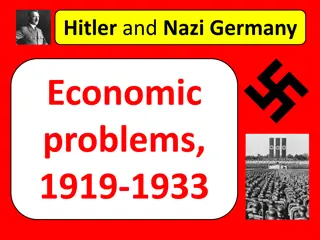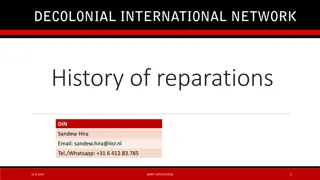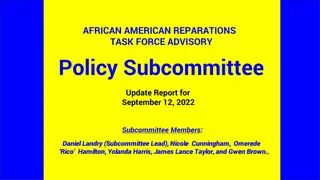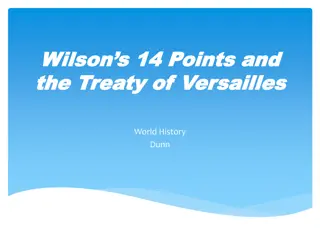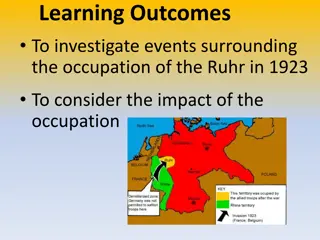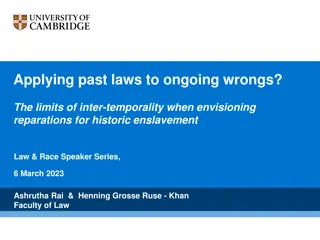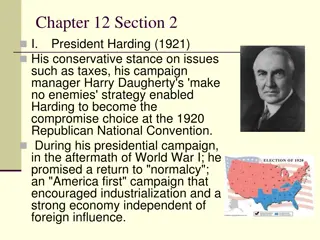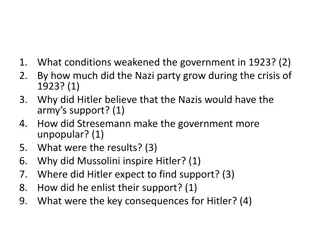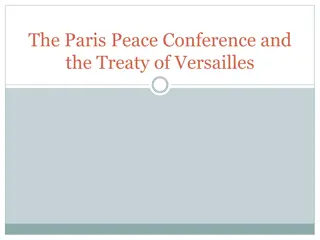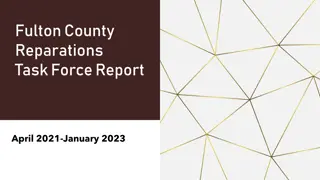Impact of Treaty of Versailles on Germany up to 1923
Germany faced immediate harsh consequences from the Treaty of Versailles, including huge reparations, loss of resource-rich lands, and political turmoil. The treaty led to economic bankruptcy, hyperinflation, and social unrest, with right-wing extremists attempting coups and assassinations. The occu
1 views • 8 slides
Negotiations at the Paris Peace Conference: The Treaty of Versailles
The Paris Peace Conference of 1919 marked a significant event where the Treaty of Versailles was negotiated by the Big Three - Woodrow Wilson, Georges Clemenceau, and David Lloyd George. This treaty addressed key areas such as assigning guilt for the war, reducing armies, determining reparations, la
1 views • 19 slides
Historical Atrocities and State Responsibility: Namibian Genocide Seminar
Explore the legal analysis of the Namibian Genocide under German colonial rule, focusing on international responsibility and reparations. Delve into the historical background, negotiations, and the 2021 Joint Declaration between Germany and Namibia regarding the atrocities. Understand the events fro
1 views • 23 slides
ANC Women's League Oral Submission on Expropriation Bill [B23.2020]
ANC Women's League presented an oral submission to the Portfolio Committee on Public Works and Infrastructure regarding the Expropriation Bill [B23.2020]. The submission focuses on the history of land and property in South Africa, advocating for the expropriation and reparations of property for the
0 views • 19 slides
Economic Crises Faced by Weimar Republic, 1919-1933
The Weimar Republic encountered significant economic challenges between 1919 and 1933, leading to chaos and a surge in extremist support. Major crises included hyperinflation in 1923 and the devastating global Depression starting in 1929. The Treaty of Versailles imposed reparations on Germany, whic
0 views • 24 slides
Historical Struggles for Reparations: Insights from Different Traditions
Explore the historical context of reparations through different traditions like the indigenous, Black, anti-colonial, African, and more, highlighting significant events such as land grants to Alaskan Natives and compensation for African American farmers. Learn about the ongoing fight for justice and
0 views • 19 slides
African American Reparations Task Force Advisory Policy Subcommittee Update
The African American Reparations Task Force Advisory Policy Subcommittee in San Francisco aims to develop policy and legislative priorities focusing on reparations for African Americans. Their objectives include reviewing laws impacting Black people, collaborating with other subcommittees, and propo
0 views • 19 slides
Versailles Treaty and Wilson's 14 Points in World History
Wilson's 14 Points aimed to prevent future wars by advocating for an end to secret agreements, self-determination for ethnic groups, and the establishment of a League of Nations. However, at the Treaty of Versailles, conflicting interests among world leaders led to a different outcome, with Germany
0 views • 14 slides
Impact of the Ruhr Occupation in 1923: Economic Crisis and Political Strain
The French occupation of the Ruhr in 1923 exacerbated the economic challenges faced by the Weimar Republic, leading to hyperinflation and increased tensions with France and Belgium. Germany's struggles to pay reparations, coupled with the occupation of crucial industrial areas, intensified the crisi
0 views • 20 slides
Examining Reparations for Historic Enslavement: Inter-temporal Challenges
The Law & Race Speaker Series on applying past laws to ongoing wrongs explores the complexities of seeking reparations for historic enslavement. The discussion delves into the inter-temporal considerations, touching on reparation claims by CARICOM, the impact of transatlantic chattel slavery on glob
0 views • 27 slides
President Harding and His Administration: A Conservative Era in American Politics
President Harding, known for his conservative stance on taxes and his "America first" campaign, was a compromise choice at the 1920 Republican National Convention. Despite calming the nation with his words, his administration faced numerous scandals. His policies, like the Fordney McCumber Tariff, a
0 views • 8 slides
Evaluating Weimar Germany's Recovery Period 1924-1929
The period of Weimar Germany from 1924 to 1929 witnessed economic, diplomatic, and political recovery under the leadership of Stresemann. The strengths included growth in industries, resolution of the reparations issue, and improved working conditions. However, challenges such as budget deficits, de
0 views • 15 slides
Influential Forces and Outcome of the Paris Peace Conference & Treaty of Versailles
Representatives of major nations convened at the Paris Peace Conference in 1919 to discuss the post-World War I peace process. The Big Four, comprising Great Britain, France, the United States, and Italy, had significant influences in shaping the Treaty of Versailles. The demands of the Big Four var
0 views • 7 slides
Fulton County Reparations Task Force Report Summary
The Fulton County Reparations Task Force Report, covering the period from April 2021 to January 2023, outlines the advisory board members, researchers, summary meetings, research areas, recommendations, studies conducted, records accessed, and support needed for the task force. It emphasizes the imp
0 views • 9 slides
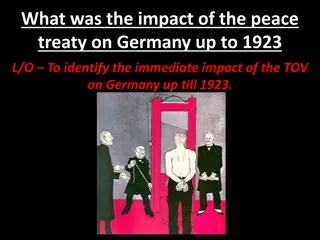
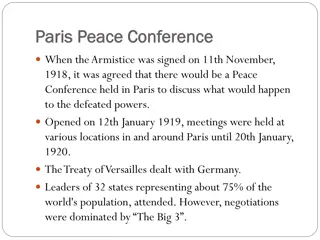
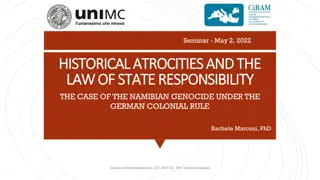
![ANC Women's League Oral Submission on Expropriation Bill [B23.2020]](/thumb/136076/anc-women-s-league-oral-submission-on-expropriation-bill-b23-2020.jpg)
